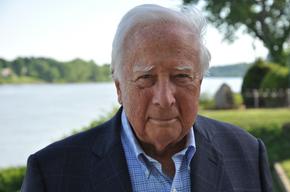 |
|
| David McCullough | |
David McCullough, "master of the art of narrative history," died on Sunday at age 89. He wrote a dozen books whose subjects included John Adams, Harry Truman, Theodore Roosevelt, the Wright Brothers, the Panama Canal, the Brooklyn Bridge and the Johnstown Flood.
McCullough won the Pulitzer Prize twice, for Truman and John Adams; won the National Book Award twice, for The Path Between the Seas: The Creation of the Panama Canal and Mornings on Horseback: The Story of an Extraordinary Family, a Vanished Way of Life and the Unique Child Who Became Theodore Roosevelt; and won the Francis Parkman Prize twice, for Truman and The Path Between the Seas. He received the Presidential Medal of Freedom, the country's highest civilian award; the National Book Foundation Distinguished Contribution to American Letters Award; the National Humanities Medal; and the American Academy of Arts and Letters' Gold Medal for Biography. He was elected to the American Academy of Arts and Sciences and the American Academy of Arts and Letters and was president of the Society of American Historians. He was named an Officer of the Legion of Honor by the President of the Republic of France. He received 56 honorary degrees.
He was also honored for his work as a narrator and host for documentaries and TV shows. He won an Emmy for hosting the PBS series Smithsonian World. He hosted PBS's American Experience and narrated historical documentaries, including Ken Burns's The Civil War, as well as narrated the audiobook versions of many of his own books. He also had a role in the movie Seabiscuit. His own John Adams became a hit HBO mini-series starring Paul Giamatti.
He was also a teacher, lecturer and editor whose talks on most any subject were mesmerizing and authoritative.
He was best known, of course, for his books, which have been published in 19 languages and sold more than 14 million copies in all formats. He is one of the few authors who never had one of his books go out of print.
His first book was The Johnstown Flood, which was published in 1968. As the New York Times wrote, it "established him as one who could take a familiar story--the great dam failure in Pennsylvania in 1889 that killed more than 2,000 people--and give it a larger life."
The success of that book allowed him to write full-time. His other works, besides his major prize winners, included The Great Bridge: The Epic Story of the Building of the Brooklyn Bridge; Brave Companions: Portraits in History, an essay collection; 1776, about the military under George Washington; In the Dark Streets Shineth: A 1941 Christmas Eve Story, about the meeting of Franklin D. Roosevelt and Winston Churchill in Washington, D.C., just weeks after Pearl Harbor; The Greater Journey: Americans in Paris; The American Spirit: Who We Are and What We Stand For; and his most recent book, published in 2019, The Pioneers: The Heroic Story of the Settlers Who Brought the American Ideal West. All his books were published by Simon & Schuster.
Jonathan Karp, president and CEO of S&S, called McCullough "a national treasure. His books brought history to life for millions of readers. Through his biographies, he dramatically illustrated the most ennobling parts of the American character. Simon & Schuster has been honored to be David's publisher for 54 years. He was greatly admired and beloved throughout our company. We will cherish his work for as long as we are publishing books."
Ken Burns praised McCullough on Twitter, saying, "It is impossible to conceive that David McCullough is no longer with us. He is among our greatest historians, writing with an almost magical command of language and story. He was also a gifted teacher who taught me about history and writing, and allowed me to escape my many limitations in those areas. I'll forever cherish the time we spent together, and I'll miss my friend dearly."
Librarian of Congress Carla Hayden wrote on Twitter, "I'm saddened to hear about the passing of the great historian David McCullough. His dedication in telling this nation's story taught us more about the American spirit and its value to our collective history. For that we are forever grateful. He truly was an American treasure."
The Boston Globe wrote that McCullough "saw himself belonging to the tradition exemplified by such popular nonacademic historians as Barbara Tuchman and Bruce Catton. He wrote for the interested layperson, not graduate students." In a 2005 interview with the Globe, McCullough explained: "So many people have been led to believe--often, unfortunately, by the experience of dreary teaching--that 'history' and 'boring' are synonymous. To me, it's the reverse. The wonderful thing about almost any subject in history is, if you scratch the surface, you find life. It's all around us."
He added: "I want my books to be read by people of all kinds. I want to write for the fellow who lives next door over here, and I want to write for the president of MIT. But most of all, I want to write the kind of book I'd want to read."

